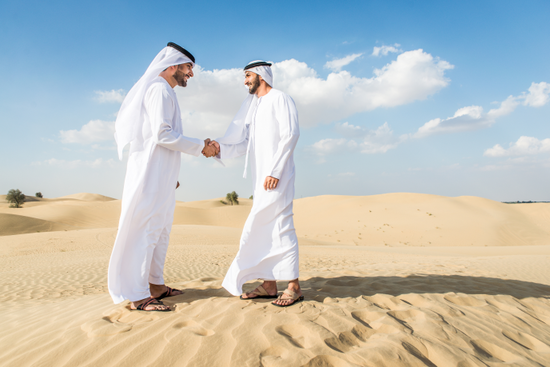How to greet in Arabic
Welcome to your Arabic class! This will not be anything too difficult, as we want to equip you with some Arabic basic phrases, which will be useful in parts of conversation with your Arabic friends.
Here is a summary of the most common Arabic phrases. To greet someone, you can use one of the following greetings:
Hello (Peace be with you) = As-salaamu alaykum
Welcome = Marhaba
To include some extra Arabic phrases in your conversation, why not include:
Goodbye = Ma’a Salama
How are you? = Kaeef Halak
Good morning = Sabah el Khair
Good evening = Massa el Khair
Sorry = Asif
Thank you = Shukran
Yes = Naam
No = La
Let’s go! = Yalla!
Keeping conversation
There are a couple of ways of how to say hello in Arabic. The most common would be: as-salaamu alaykum. This is typically used in conversation between two people as a warm greeting. Marhaba translates to ‘welcome’, and can be used as an informal greeting for welcoming guests, particularly into your home.
If you’re in conversation at a Souk or local market, a great word to have in your vocabulary is shukran. This directly translates to ‘thank you’ and can act as a way to endear yourself whenever you’re in negotiation.
If you want to take your basic greetings even further, there are ways to greet in both the morning and the evening. There are two phrases to remember here, one for morning and the other for the evening: Sabah el Khair, and Massa el Khair. The word Sabah translates to ‘morning’, and Massa means ‘evening’.
For visitors who are in conversation with an Arabic speaker, phrases such as Naam and La are good indicators that show you are engaged and listening.

Religious phrases
While in conversation with an Arabic speaker, you may come across certain phrases which have religious connotations. Provided they are said respectfully and in the right context, non-Muslim friends are more than welcome to incorporate these into their conversations.
A very common phrase used in Arabic conversation is Alhamdulillah. This can be shortened to Hamdallah when speaking, and is used as a way to express gratitude. An example of this could be to answer the question ‘how are you?’ with ‘I am well, Hamdallah’.
Inshallah is also a phrase you will commonly hear in Arabic conversation. This translates to ‘God willing’, which is interchangeable with phrases such as ‘I hope so’, or ‘hopefully’. Mashallah is a positive phrase to express the belief that ‘God has willed’ something. The key difference between Inshallah and Mashallah is that something is either being wished for, and something that has been willed for has happened.
Bismillah is used as a phrase which translates to ‘in the name of God’. This is typically a phrase that will be used by Muslims when they are beginning a task, which is typically a prayer. While it is unlikely to be a phrase that non-Muslims would use themselves owing to its deeply religious connotations, it’s a good one to know!
FAQs
Are there any cultural considerations to keep in mind when using greetings in Arabic?
Arabic culture rewards politeness and humility. If you are to communicate in a polite and humble manner when greeting in Arabic, this will be reflected in the way you are communicated with.
Are there different Arabic greetings for different occasions?
There are some specific, more complex Arabic phrases that are appropriate for special occasions.
Congratulations! = Allah ybaarik feek (to a male); Allah ybaarik feeki (to a female)
Happy birthday! = eid meelaad sa’eed
How do you greet people in the UAE?
English is a widely spoken language in the UAE, and if you are a tourist in the UAE you will be fine greeting your Emirati hosts in English. However, if you really want to create a positive impression with your hosts, use the greeting as-salaamu alaykum.
How do Muslims say thank you?
If Muslims are speaking Arabic, they will say shukran to express their thanks.
What means 'yalla' in Arabic?
Yalla means let’s go! It’s a great word to say out loud. Give it a try!
How do you say yes in Dubai?
If you’re talking to someone in Dubai, you will most likely be able to communicate in English. However, if you’re looking to practice your Arabic, you can say yes in Arabic by saying ‘naam’. On the topic, no translates to ‘La’.